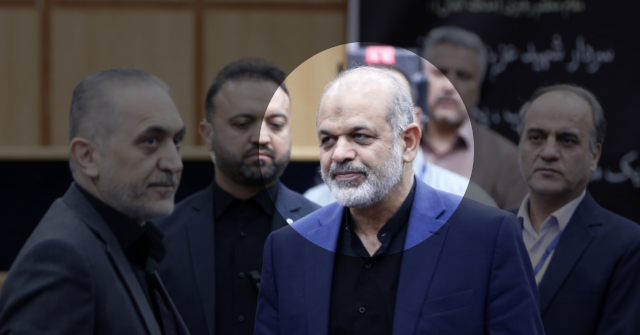A judge in Argentina ruled on Thursday that the country could place ten Iranian and Lebanese citizens — including the recently appointed head of Iran’s Islamic Revolutionary Guard Corps (IRGC) — on trial in absentia for their suspected roles in the 1994 bombing of the Argentine-Israeli Mutual Association (AMIA).
The AMIA bombing killed 85 people and left hundreds injured; it was the deadliest terrorist attack in the history of the Western Hemisphere at the time and retained the title until September 11, 2001. The individuals approved for an in-absentia trial on Thursday are Iranian current and former officials and suspected members of the Iranian proxy terrorist organization Hezbollah — all Iranian and Lebanese citizens.
Argentine authorities identified these individuals decades ago — and some others who have since died — as the masterminds and executers of the attack as well as the 1992 bombing of the Israeli embassy in Buenos Aires, which killed another 29 people. Iran has adamantly rejected any evidence linking it to the attack, condemned Argentine officials for seeking justice in the case, and have been otherwise uncooperative with the investigation. The significant evidence against the individuals in question led Interpol to issue red notices, requests for arrest, in 2006 for several senior Iranian officials.
Argentina has traditionally not permitted in-absentia trials. Under current President Javier Milei — who recently declared Iran an “enemy of Argentina” following a visit to Israel — the Argentine Senate passed a law in February that legalized in-absentia trials. The AMIA case is the first and most high-profile attempt to implement the law since it passed.
Judge Daniel Rafecas approved such trials for ten fugitives. The most prominent name on the list is the commander of the IRGC, General Ahmad Vahidi, who received the title this month after the Israel Defense Forces (IDF) eliminated his predecessor, Major General Hossein Salami, in an airstrike on June 13. Israeli launched a military operation that day to contain Iran’s threats of attack after the United Nations declared Iran in breach of international legal obligations regarding nuclear non-proliferation. The IRGC is a win of the Iranian armed forces and a U.S.-designated terrorist organization.
Others approved for in-absentia trials include two current members of Iran’s Expediency Discernment Council, a top government body, Ali Akbar Velayati and Mohsen Rezai. Rezai is also a senior IRGC officer. Rafecas approved trials for cleric Mohsen Rabbani, Iranian official Ali Fallahijan, and several Lebanese accused Hezbollah members.
The individuals in question have never presented themselves before the Argentine legal system despite being wanted for decades. The attorneys tasked with their defense at the court argued that in-absentia trials were unconstitutional in the country, but failed. Judge Rafecas did assert, however, that in-absentia trials should be limited to special cases in which no other viable option exists and the absence of such a legal process would actively deprive the victims of a grievous crime of justice.
“Especially in grave international crimes (genocide, war crimes, and crimes against humanity), the accused are military or political leaders with resources to hide or flee countries without extradition,” the judge wrote in his ruling, according to the Argentine newspaper Clarín. Without such a trial, the individuals “may remain indefinitely fugitives and the cases could remain paralyzed… and depriving victims of justice.”
Rafecas also warned that, “in situations of war crimes or terrorism, not judging the accused could weaken the [public] trust in the justice system.”
Argentina’s road to justice for the AMIA victims has been a long and dangerous one, impeded for years by leftist governments seeking to improve diplomatic ties with the Iranian regime. While years of research led to the Interpol red notices in 2006, no significant action to enforce those notices was taken for nearly a decade. In a breakthrough for the case, the prosecutor tasked with it, Alberto Nisman, had prepared an extensive case to present before Congress in 2015 accusing then-President Cristina Fernández de Kirchner of conspiring with Tehran to protect the accused perpetrators of the bombing in exchange for favorable trade deals.
The day before Nisman was to present his case before Congress — on January 15, 2015 — he was found dead of a gunshot wound to the head in his apartment. A draft arrest warrant for Fernández was found in his trash bin. His death was ruled a suicide.
Former President Mauricio Macri, who succeeded Fernández de Kirchner, rescinded her memorandum of understanding with Iran, but the case did not move forward in any other major way during his term. Fernández de Kirchner returned to power as vice president under former President Alberto Fernández (no relation) in 2019; only following the election of current President Javier Milei, who took office in 2023, did legal processes in the AMIA case accelerate.
In addition to the in-absentia trial law, the Milei administration expedited a case in the country’s Federal Criminal Cassation Court against the Iranian government and Hezbollah as organizations, finding them both responsible in April 2024 for the AMIA attack 30 years prior.
In April, prosecutor Sebastián Basso, who succeeded Alberto Nisman, requested an arrest warrant for Iranian “supreme leader” Ayatollah Ali Khamenei.

















